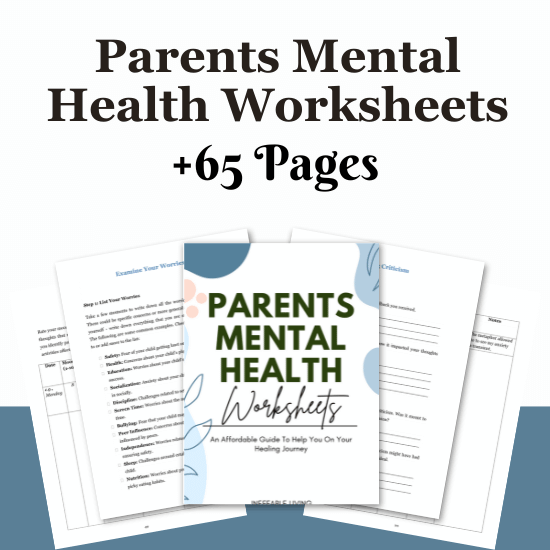In this post, you’re going to learn all about depleted mother syndrome – its signs and how to cope.
What Is Depleted Mother Syndrome?
Depleted Mother Syndrome is not an officially recognized mental health diagnosis, but it is a term used to describe the experience of emotional, physical, and mental exhaustion that many mothers may face.
This syndrome encompasses the multifaceted challenges and stressors associated with the demands of motherhood, parenting, and caregiving, which can extend beyond the postpartum period.
In general, Depleted Mother Syndrome can manifest as a result of prolonged and overwhelming responsibilities associated with parenting, coupled with inadequate opportunities for self-care, social support, and emotional replenishment.
This can lead to a depletion of physical energy, emotional resilience, and a sense of personal fulfillment in the maternal role.
Signs of Depleted Mother Syndrome
It’s important to note that each individual’s experience may vary, but common signs and symptoms include:
1. Persistent Fatigue:
Mothers experiencing Depleted Mother Syndrome often report feeling persistently exhausted, regardless of the amount of rest they receive.
This fatigue can be physical, emotional, and mental in nature.
2. Mood Fluctuations:
Women with Depleted Mother Syndrome may experience mood swings, increased irritability, anxiety, or feelings of being overwhelmed.
These mood fluctuations may impact their ability to cope with the demands of motherhood.
3. Cognitive Challenges:
Difficulty concentrating, memory lapses, and cognitive fog are common cognitive challenges experienced by mothers with Depleted Mother Syndrome.
These difficulties can interfere with daily functioning and decision-making.
4. Physical Symptoms:
Physical symptoms such as headaches, muscle tension, gastrointestinal disturbances, and a weakened immune system may manifest in mothers experiencing depletion.
5. Social Withdrawal:
Mothers with Depleted Mother Syndrome may withdraw from social interactions, feel a lack of motivation to engage in previously enjoyed activities, and struggle to connect with others outside the immediate demands of caregiving.
6. Feelings of Guilt and Inadequacy:
Mothers experiencing depletion may harbor feelings of guilt, self-doubt, or a sense of inadequacy in their maternal role.
They may also question their ability to meet the needs of their child adequately.
7. Sleep Disturbances:
Disrupted sleep patterns due to nighttime feedings, infant care, and heightened vigilance can exacerbate feelings of exhaustion and contribute to the overall depletion experienced by mothers.
8. Difficulty Bonding with the Baby:
Some mothers may find it challenging to bond with their newborn or experience a sense of emotional detachment, which can be distressing and raise concerns about their ability to nurture their child effectively.
Related: How to Cope With Caring for Elderly Parents Stress?
What Causes Depleted Mother Syndrome?
Common contributing factors to Depleted Mother Syndrome include:
1. Chronic Sleep Deprivation:
Disrupted sleep patterns due to nighttime feedings, soothing a child, or attending to the needs of multiple children can result in chronic sleep deprivation, which contributes to physical and emotional exhaustion.
2. Unrelenting Caregiving Responsibilities:
The unceasing nature of caregiving, including managing household tasks, tending to the emotional and physical needs of children, and balancing work commitments, can lead to a sense of being constantly overwhelmed and depleted.
3. Lack of Personal Time and Self-Care:
Mothers may struggle to find dedicated time for self-care activities, rest, or engaging in pursuits that bring them joy and fulfillment outside of their caregiving responsibilities.
4. Emotional and Mental Load:
Managing the emotional needs, behavioral challenges, and developmental milestones of children, paired with the mental load of organizing and planning for the family, can contribute to emotional exhaustion and cognitive strain.
5. Social Isolation:
Limited opportunities for meaningful social connection and support can exacerbate feelings of loneliness, isolation, and an absence of emotional replenishment.
6. High Expectations and Self-Criticism:
Unrealistic expectations of motherhood, coupled with self-criticism and a fear of falling short in the maternal role, can contribute to feelings of inadequacy and emotional depletion.
Related: Best 20 Low-Stress Jobs After Retirement
How to Cope with Depleted Mother Syndrome?
Here are key strategies for coping with Depleted Mother Syndrome:
1. Prioritize Self-Care
Encouraging mothers to prioritize their own well-being is essential for coping with Depleted Mother Syndrome.
This includes getting adequate rest, nourishing their bodies with healthy food, engaging in physical activity when possible, and finding moments for relaxation and rejuvenation.
Setting aside dedicated time for self-care activities, such as reading, taking a bath, or practicing mindfulness, can be valuable for replenishing emotional reserves.
2. Seek Social Support
Building a support network is crucial for mothers experiencing Depleted Mother Syndrome.
Connecting with other mothers, family members, friends, and community resources can provide opportunities for sharing experiences, seeking advice, and receiving practical assistance.
Joining parenting groups, both in person and online, can also foster a sense of camaraderie and validation.
3. Communicate Openly
Encouraging open communication with partners, family members, and friends about feelings of depletion and the challenges of early motherhood is vital.
Expressing thoughts and emotions without fear of judgment can serve as a cathartic release and foster understanding and empathy from loved ones.
Related: 4 Essential Keys To Effective Communication
4. Set Realistic Expectations
Helping mothers set realistic expectations for themselves and their caregiving responsibilities is important for managing the demands of motherhood.
It’s crucial to acknowledge that it’s okay to ask for help and that perfection is not a realistic standard.
Setting achievable goals for each day and being flexible when unexpected challenges arise can alleviate the pressure of striving for an unattainable ideal.
5. Prioritize Sleep
Encouraging mothers to prioritize sleep, even in fragmented cycles, is crucial for coping with Depleted Mother Syndrome.
Partners and support networks can assist in creating opportunities for rest by sharing nighttime caregiving responsibilities and allowing mothers to nap during the day when their babies sleep.
Related: Am I Sleep Deprived Quiz (+Top Tips On How To Get Quality Sleep & Stop Bad Dreams)
6. Nourish Emotional Well-Being
Engaging in activities that promote emotional well-being, such as journaling, creative expression, meditation, or engaging in hobbies, can support mothers in coping with the emotional toll of Depleted Mother Syndrome.
Acknowledging and validating one’s emotional experiences is an important aspect of nurturing emotional well-being.
7. Practice Mindfulness
Encouraging mothers to practice mindfulness and present moment awareness can help alleviate feelings of overwhelm and anxiety.
Mindfulness techniques, such as deep breathing exercises, progressive muscle relaxation, and guided imagery, can promote a sense of calm and centeredness.
8. Engage in Physical Activity
When appropriate, incorporating physical activity into daily routines can contribute to improved energy levels, mood regulation, and overall well-being.
This might include gentle walks with the baby, postnatal yoga, or other forms of exercise that are conducive to the postpartum recovery process.
9. Create Boundaries and Delegate Tasks
Setting boundaries around time and energy, and delegating tasks to partners, family members, or hired support when feasible, can alleviate the burden of overwhelming responsibilities and provide mothers with opportunities for self-care.
Related: 7 Types of Boundaries (+FREE Worksheets)

Conclusion
Coping with Depleted Mother Syndrome involves a comprehensive approach that encompasses physical, emotional, and social well-being.



